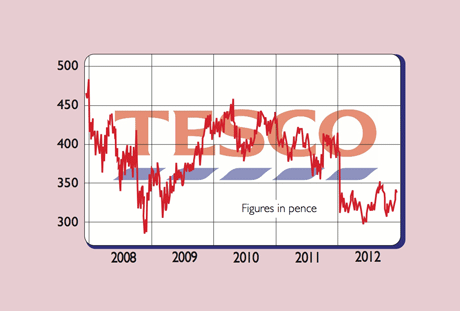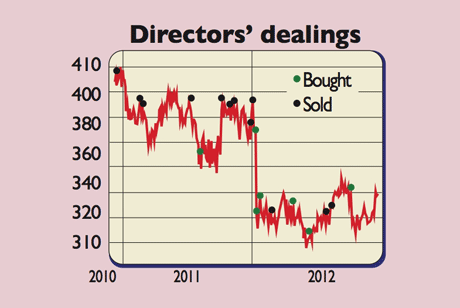Shares in focus: Tesco stuck in no man’s land
Tesco has been on a roll for much of the last decade, but now the supermarket giant has run into trouble. Should you buy the shares? Phil Oakley investigates.
Get the latest financial news, insights and expert analysis from our award-winning MoneyWeek team, to help you understand what really matters when it comes to your finances.
You are now subscribed
Your newsletter sign-up was successful
Want to add more newsletters?

Twice daily
MoneyWeek
Get the latest financial news, insights and expert analysis from our award-winning MoneyWeek team, to help you understand what really matters when it comes to your finances.

Four times a week
Look After My Bills
Sign up to our free money-saving newsletter, filled with the latest news and expert advice to help you find the best tips and deals for managing your bills. Start saving today!
The Tesco growth juggernaut has sunk into a bog, says Phil Oakley.
The business
Tesco is the third-biggest retailer in the world behind America's Walmart and France's Carrefour. Altogether it has 6,612 stores with a combined selling area of 115 million square feet. It sells groceries and non-food items from TVs and clothes to mobile phones to customers in 14 countries. Britain remains Tesco's biggest market.
It has more than 3,000 stores, ranging from small convenience outlets to out-of-town hypermarkets. It also sells goods online through Tesco.com. Tesco dominates British retailing and accounts for more than 30% of the British grocery market. It also has a banking business with more than £5bn of customer deposits.
MoneyWeek
Subscribe to MoneyWeek today and get your first six magazine issues absolutely FREE

Sign up to Money Morning
Don't miss the latest investment and personal finances news, market analysis, plus money-saving tips with our free twice-daily newsletter
Don't miss the latest investment and personal finances news, market analysis, plus money-saving tips with our free twice-daily newsletter
It has an extensive presence in eastern Europe and Asia, alongside its Fresh & Easy business in America. Tesco had sales of £64.5bn in the year to February 2012.
The history
The retailer began life in 1919 when Jack Cohen set up a market stall in London's East End. He bought his first day's stock using the money he got when he left the air force. His first day of trading went well he made a profit of £1 on sales of £4. After spending the 1920s setting up more market stalls in London, Cohen opened the first Tesco branch in Edgware, London, in 1929.
The name Tesco came from a brand of tea that the first store sold. The tea was bought from a company called TE Stockwell, so Cohen used the first three letters from this business, and the first two letters of his own surname, to create Tesco. After expanding within London, Tesco spent the next few decades buying up other UK retailers and building lots of its own stores.
By the mid-1970s, the business had grown to more than 900 stores on the back of a pile them high and sell them cheap' strategy. But all was not well. It had wafer-thin profit margins and a poor image problem with the British public. Many of its stores were scruffy and customer service was poor. This all changed when Ian MacLaurin starting running the business in the 1980s. MacLaurin brought a focus on better-quality food and improved service.
During the early 1990s, Tesco introduced the Clubcard loyalty scheme, whereby customers collected points that could be converted into discounts on future shopping at the store. The scheme was a big hit with customers. By 1995, Tesco had overtaken Sainsbury's to become the market leader in Britain.
It then started to expand overseas into eastern Europe and then Asia. Under the leadership of Sir Terry Leahy from 1997, Tesco doubled its market share in Britain by giving customers what they wanted. This included smaller convenience stores in central locations in towns and cities (Tesco Metro) and cheap petrol stations.
Buying chains of convenience stores and building out its huge land bank also helped. Its main rivals struggled to keep up. By 2007, Tesco felt brave enough to enter the American market with its Fresh & Easy brand, traditionally something of a graveyard for British retailers.
But the Tesco juggernaut has now ground to a halt. Having taking its eye off the ball in Britain, its competitors are now fighting back. With problems abroad too particularly in America, where it seems even Tesco can't make a go of it many are asking whether Tesco's glory days are behind it.
The chief executive
Philip Clarke, who took over from Sir Terry last year, has worked for Tesco for a large part of his life. He stacked shelves as a schoolboy on Merseyside in a store run by his dad. After university, he steadily worked his way up the corporate ladder. Before he became chief executive, he was running Tesco's international business. Very much a hands-on boss, he prefers to walk the shop floor than sit behind a desk. He took home £1.1m last year.
Should you buy the shares?
One thing's for sure, Clarke will need all his experience and more to turn Tesco around from here. Whether or not you buy the shares depends on whether you think he can do this and Tesco can start growing again. It's going to be hard to do this in Britain. Competition is cut-throat, with too many supermarkets chasing too little money.
This means that Tesco cannot build its way out of trouble. It's going to have to convince more customers to shop with it. The trouble is that once customers go elsewhere, it's difficult to get them to come back. Also, Tesco is caught somewhere in the middle of its key food market. People are shopping for quality food at the likes of Waitrose and Sainsbury's. Meanwhile, bargain hunters are going to Asda, Aldi and Lidl. Tesco is stuck in no man's land between them.
But Tesco's problems run deeper than this. It has spent the last decade or so building lots of huge hypermarkets to sell general household merchandise. People are not buying as much of this stuff as tough times hit their wallets and, when they do buy, they often go online rather than to a supermarket. These stores are not paying their way and are now a millstone around Tesco's neck. They could be a drag on profits for years to come.
Overseas business isn't much better. Sales in central Europe are plummeting as unemployment goes up; Asia is performing a bit better, but is hardly stellar. Fresh & Easy in America has been a disaster for Tesco and has cost shareholders a lot of money. Once again, a British retail brand has found out how hard it can be to sell in America. The unit is currently under review' shutting the business down would be a good idea and now seems likely.
With all these problems, just how will Tesco's profits grow in future? With poor growth prospects and with the shares trading on just over ten times earnings, Tesco isn't particularly cheap, and a dividend yield of 4% isn't enticing if dividends aren't going to grow much. With strong daily cash flow from its stores, Tesco won't go bust, but its finances aren't rosy either. It has sold a lot of its stores and is renting them back from property firms, meaning there is a hidden debt pile of at least £10bn to service.
Tesco resembles a big balloon that is slowly deflating. Unless trade picks up, we wouldn't be surprised to see the shares fall further from here. If they shed 50p, they might be quite interesting (that would bump the yield up to above 5%), but there's no need to buy them now.
Verdict: AVOID
The numbers

Stockmarket code: TSCO
Share price: 336p
Market cap: £27bn
Net assets (August 2012): £17.5bn
Net cash (August 2012): £7.2bn
P/e (current year estimate): 10.5 times
Yield (prospective): 4.3%
Interest cover: 6.5 times
What the analysts say
Buy: 10
Hold: 11
Sell: 9
Average price target: 365p
Directors' shareholdings

P Clarke (CEO): 1,973,243
L McIlwee (FD): 129,565
R Broadbent (chairman): 53,996
Get the latest financial news, insights and expert analysis from our award-winning MoneyWeek team, to help you understand what really matters when it comes to your finances.
Phil spent 13 years as an investment analyst for both stockbroking and fund management companies.
-
 Should you buy an active ETF?
Should you buy an active ETF?ETFs are often mischaracterised as passive products, but they can be a convenient way to add active management to your portfolio
-
 Power up your pension before 5 April – easy ways to save before the tax year end
Power up your pension before 5 April – easy ways to save before the tax year endWith the end of the tax year looming, pension savers currently have a window to review and maximise what’s going into their retirement funds – we look at how
-
 Somero: trading this overlooked bargain
Somero: trading this overlooked bargainFeatures Mechanical-screed maker Somero dominates its niche and is attractively valued. Matthew Partridge picks the best way to trade it.
-
 How to find big profits in small companies
How to find big profits in small companiesCover Story The small- and micro-cap sectors are risky and volatile. But with careful research and patience, investors could make huge gains. Matthew Partridge explains how to find the market’s top tiddlers.
-
 The hidden gems on Aim, London's junior market
The hidden gems on Aim, London's junior marketFeatures Aim, London’s junior market, is risky – but you can find solid stocks at low prices. Scott Longley reports.
-
Three Aim-listed firms that will thrive in a post-Brexit world
Opinion Matt Tonge and Victoria Stevens of the Liontrust UK Smaller Companies Fund pick three Aim-listed firms that will survive Brexit turmoil.
-
Fetch! The Chinese small-cap stocks to buy in the Year of the Dog
Opinion Each week, a professional investor tells us where she’d put her money. This week: Tiffany Hsiao of Matthews Asia selects three Chinese small-cap stocks with exciting potential.
-
Small and mid-cap stocks with big potential
Opinion Professional investor Guy Anderson of the Mercantile Investment Trust selects three small and medium-sized firms with promising prospects that the market has missed.
-
 Get cheap, reliable growth from smaller companies
Get cheap, reliable growth from smaller companiesFeatures One of the most reliable long-term investment trends is the long-term outperformance of smaller companies over blue chips. Max King picks some of the best ways to buy into this growth.
-
 Now the bitcoin bubble’s burst, what’s the next big thing?
Now the bitcoin bubble’s burst, what’s the next big thing?Features Forget bitcoin, if you want to increase your wealth faster than most other people, you need to find the next big thing. Merryn Somerset Webb suggests some places to look.